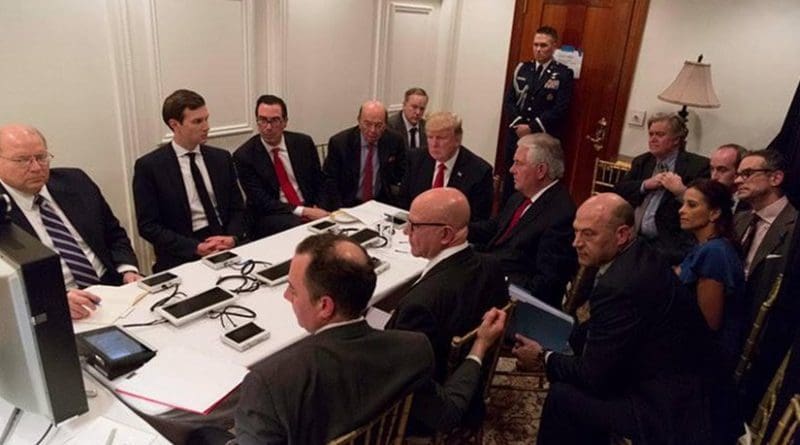Chemical Weapons Must Not Be Used, Ever – OpEd
By IDN
By Sergio Duarte, former UN High Representative for Disarmament Affairs*
In the current stage of evolution of international law and universally accepted norms of civilised behaviour, the use of any weapon of mass destruction by any actor whatsoever affronts the conscience of mankind and cannot be tolerated.
The responsibility for the recent episode of the use of chemical weapons in Syria has not yet been clearly established. But the posturing of the players in this dramatic episode sometimes obscures the appalling reality that a weapon of mass destruction with such cruel and indiscriminate effects still exists in national arsenals of a handful of countries or in clandestine caches.
In 2013 and 2014 chemical weapons were used in Damascus, Aleppo and other places in Syria. Under international pressure, Syria became a Party to the Chemical Weapons Convention, clearing the way for the destruction of its stocks of such weapons. The Organization for the Prohibition of Chemical Weapons (OPCW) and other international agencies sent inspectors and experts to the ground to verify declared stocks and oversee their destruction.
The United States government claimed that 100% of the chemical weapons had been destroyed. However, there were reports that a part of the stocks could have been hidden from the inspectors or seized by any of the warring groups in the country. Small quantities of lethal chemicals may even have been manufactured in clandestine laboratories out of the sight of inspectors and spy satellites.
A couple of weeks ago the release of a lethal chemical agent killed over 80 people, among them many children in Khan Sheikhoun in the Idlib province in Syria. At least 100 other persons are suffering their effects. The two major powers, the Syrian government and rebel factions, are exchanging accusations about the responsibility for the attacks. Whatever their origin and ownership, it is hard to keep track of weapons in the current situation on the ground in the six-year war in that country. A thorough, impartial investigation is imperative in order to find out who holds such stocks and exactly why and how they were used.
However, political rivalries and disagreements, as well as the lack of confidence among the major players, make it very difficult to reach a credible, indisputable conclusion. The use of chemical weapons – either by design or accident – is absolutely unacceptable and its perpetrators must be punished. The multilateral structures established under the United Nations and relevant international agencies are the proper channel to deal with allegations and instances of the use of such weapons.
Humanitarian reasons are behind the long and quite successful history of international attempts at limiting the use of chemical weapons dating back to the 17th century when France and Germany agreed to ban poison bullets. In 1874 the Brussels Convention on the Law and Customs of War prohibited poison or poisoned weapons, and the 1899 Hague Conference outlawed projectiles filled with poison gas. Still, chemical weapons caused over 100.000 fatalities during World War I.
Efforts were renewed after a strong reaction from the international community and civil society and in 1925 the Geneva Protocol prohibited the use of asphyxiating, poisonous or other gases as methods of warfare, but not the development, production or possession of such weapons. Many countries kept large stocks that could be used against non-signatories or to respond in kind to a chemical attack. Research continued and some powerful nerve gases were developed and added to those stocks.
Only in 1997 did the international community finally achieve a robust instrument outlawing the use, manufacture and stockpiling of chemical weapons and requiring its parties to destroy their stocks.
The OPCW, headquartered in The Hague, ensures a credible and transparent regime for verifying the destruction of such weapons and preventing their re-emergence while protecting the legitimate national security and proprietary interests. However, the comprehensive prohibition finally achieved with the adoption of the Chemical Weapons Convention is not yet universal and the destruction of stocks proceeds less quickly than anticipated. 192 States are party to the Convention, which reports that 90% of the world stocks had been eliminated by the end of 2016.
There are three recognised categories of weapons of mass destruction: chemical, bacteriological and nuclear. All are weapons of terror having excessively cruel and indiscriminate effects that hit combatants and innocent civilians alike. The first two are already prohibited by international treaties.
The international community has just started a long-awaited multilateral effort to negotiate a treaty to outlaw atomic weapons. Predictably, all nine possessors and their allies have chosen not to participate in the initiative and cling to out-dated military doctrines that contemplate using such arms in the circumstances they deem fit and even against those that do not possess them.
A nuclear confrontation will have devastating effects on the climate and populations alike, regardless of their location. It is high time to complete the task by eliminating the last remaining category of weapons of mass destruction.
* Sergio Duarte was the UN High Representative for Disarmament Affairs with the United Nations Office for Disarmament Affairs (2007-2012). He was the President of the 2005 Seventh Review Conference of the Parties to the Treaty on the Non-Proliferation of Nuclear Weapons. A career diplomat, he served the Brazilian Foreign Service for 48 years. He was the Ambassador of Brazil in a number of countries, including Austria, Croatia, Slovakia and Slovenia concurrently, China, Canada and Nicaragua. He also served in Switzerland, the United States, Argentina and Rome.

